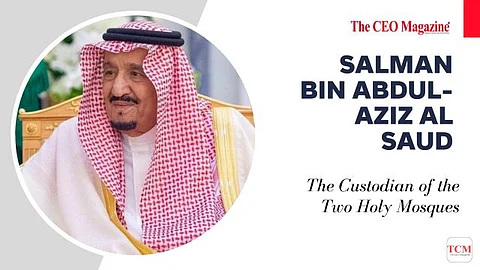
- News
- Women
- Magazine
- IndustryIndustry
- InsightsInsights
- Success Stories
- PublishPublish
- ContactContact
- Media KitMedia Kit

Salman bin Abdul-Aziz Al Saud
The Custodian of the Two Holy Mosques
Salman bin Abdul-Aziz Al Saud, born on December 31, 1935, is the King of Saudi Arabia and the Custodian of the Two Holy Mosques. His rule, which began in January 2015, came at a pivotal time in the history of the Kingdom.
His estimated net worth is around USD 25 billion. This article provides an overview of King Salman's life, career, and his role in shaping Saudi Arabia, including insights into his personal life.
Salman was born in Riyadh, Saudi Arabia, as the 25th son of King Abdul-Aziz Al Saud, the founder of the modern Kingdom of Saudi Arabia.
His mother, Hassa bint Ahmed Al Sudairi, was a member of one of the most influential and powerful families in the Kingdom. Salman's upbringing in the royal household exposed him to the intricate workings of Saudi politics and diplomacy.
Salman has married multiple times and has several children. He is known for his support of traditional Islamic values and has maintained a conservative family life in line with Saudi customs and expectations.
King Salman's career began with a focus on governance and administration in the province of Riyadh. He held various governmental positions, including Governor of Riyadh Province for 48 years. His tenure in this role allowed him to oversee the rapid modernisation and urban development of the capital city.
King Salman also played a significant role in the establishment of the King Saud University, the first university in Saudi Arabia. He was instrumental in founding the Prince Salman Center for Disability Research, which reflects his commitment to social welfare and education.
King Salman became Crown Prince in 2012, following the death of his brother, Crown Prince Nayef bin Abdul-Aziz Al Saud. He served as the Crown Prince under his half-brother, King Abdullah, until ascending to the throne in January 2015. His leadership came during a time of regional turmoil, including the Arab Spring, the Syrian civil war, and declining oil prices.
During his reign, King Salman has made several significant changes and policy decisions:
Vision 2030: In 2016, he introduced "Vision 2030," an ambitious plan aimed at diversifying the Saudi economy, reducing its dependence on oil, and modernising society.
Social Reforms: King Salman has initiated several social reforms, including allowing women to drive and opening cinemas after a 35-year ban. These efforts are seen as part of Saudi Arabia's modernisation process.
Foreign Policy: King Salman has played an influential role in regional politics, notably the Yemeni Civil War, the blockade of Qatar, and the complex relationship with Iran.
Investment and Development: He has overseen major investments in sectors like tourism and technology, with the goal of attracting foreign investment and creating jobs.
Salman bin Abdulaziz, the King of Saudi Arabia, has been married three times and is the father of at least thirteen children, including twelve sons. His first wife was his cousin, Sultana bint Turki Al Sudairi, with whom he had six children. .
Sultana passed away in 2011. His second wife, Sarah bint Faisal Al Subai'ai, produced one son, Prince Saud.
His third wife, Fahda bint Falah Al Hithlain, has given him six sons, including Crown Prince Mohammed, Prince Turki, Prince Khalid, Prince Nayef, Prince Bandar, and Prince Rakan. King Salman's family is a significant part of his life, and his children hold various important positions within the kingdom.
King Salman bin Abdul-Aziz Al Saud has presided over Saudi Arabia during a pivotal period of change and modernisation. His leadership style, characterised by his commitment to Islamic values and efforts to adapt to the challenges of a rapidly evolving world, has had a profound impact on the Kingdom.
As Saudi Arabia continues to transform, King Salman's legacy as the Custodian of the Two Holy Mosques and a pivotal figure in the Middle East remains a subject of ongoing global interest and scrutiny.
Follow us on Google News
